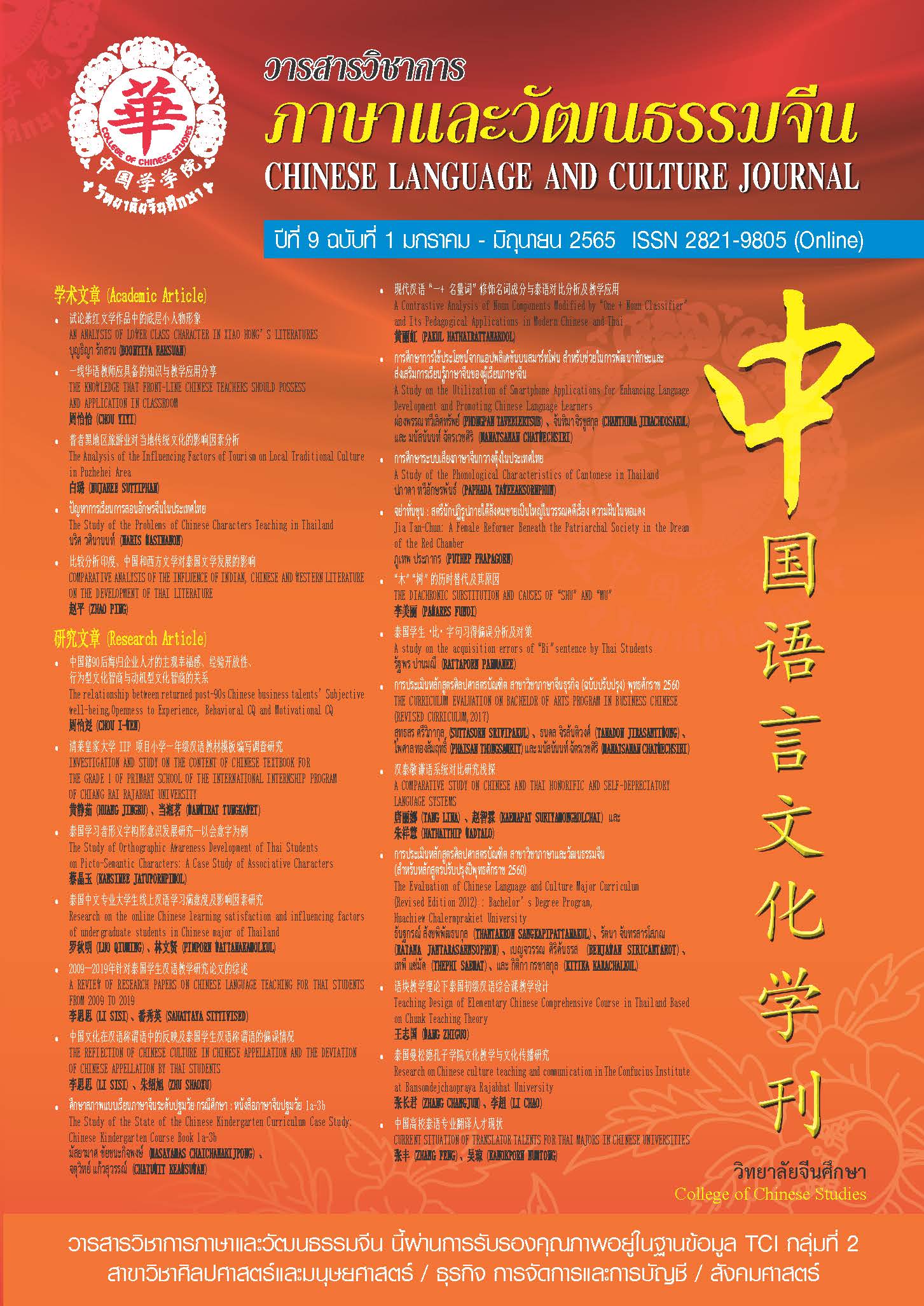การศึกษาการใช้ประโยชน์จากแอปพลิเคชันบนสมาร์ทโฟน สำหรับช่วยในการพัฒนาทักษะและส่งเสริมการเรียนรู้ภาษาจีน
A Study on the Utilization of Smartphone Applications for Enhancing Language Development and Promoting Chinese Language Learning
Keywords:
Applications, Learning and improving Chinese language skills, Promote learning ChineseAbstract
Education in the New Normal era due to the COVID-19 situation requires adjustment. Applications are therefore necessary to assist not only the development of media or innovation in teaching and learning, but also the organization of work systems in various fields such as documents.
The objectives of this research were to study (1) the utilization of smartphone applications that enhanced learning skills development and promoted Chinese language learning and (2) the satisfaction of users of applications, namely Tiktok, Facebook, Youtube and Instagram to develop skills and promote learning Chinese.
This is a quantitative research study. The research data were collected from an online questionnaire (Google Forms), in which the sample group consisted of 105 learners who were taking Chinese. This research found that Youtube was used the most to enhance Chinese language learning and the four language skills, namely listening, speaking, reading and writing, and learning Chinese conversations. Besides, Facebook was the most used application to learn Chinese vocabulary, and Chinese vocabulary topics, basic Chinese conversation or vocabulary. Basic conversation in daily life was the topic which was learned through the use of Tik Tok, Facebook, Youtube and Instagram applications. It was because they conveyed short, concise, easy, up-to-date and practical messages. Moreover, the research revealed that learners of Chinese were satisfied at a high level at the average of 4.32 with the use of Tik Tok, Facebook, Youtube and Instagram on smartphones. It was because these applications helped to develop and enhance learners’ Chinese language skills. The findings were also in line with the hypothesis of this research. It was believed that these applications on smartphones could help learners to improve their Chinese language in four skills and enhance their Chinese language learning outside the classroom. Tik Tok, Facebook, Youtube and Instagram also met the interests of Chinese language learners who learned on their own or outside the classroom. In addition, teachers, students and people who interested in learning Chinese can choose the application that is suitable for develop each skill.
References
กชพร อนันตศานต์. (ม.ป.ป.) การตัดสินใจเลือกรับชมวิดีโอออนไลน์บนแพลตฟอร์มยูทูบ (Youtube). [ออนไลน์] แหล่งที่มา : https://mmm.ru.ac.th/MMM/IS/vlt15-1/6114993618.pdf ( 18 มิถุนายน 2564 ) กนกพร ศรีญานลักษณ์. (2554) การสำรวจความพึงพอใจต่อการเรียนบทเรียนออนไลน์ ภาษาเกาหลี ภาษาจีน และ ภาษาญี่ปุ่น). [ออนไลน์] แหล่งที่มา : http://dspace.lib.buu.ac.th/xmlui/handle/1234567890/2111 ( 25 มิถุนายน 2564 )
ชลชินี บุนนาค. (2560) การสำรวจรูปแบบการดำเนินชีวิตบนอินสตาแกรม. [ออนไลน์] แหล่งที่มา : http://dspace.bu.ac.th/bitstream/123456789/3127/3/chonchinee_bunn.pdf ( 3 กรกฎาคม 2564 )
ธีรนันท์ ศรีวิทัศน์, กัญณภัทร นิธิศวราภากุล และปิยลักษณ์ อัครรัตน์. (2563). การจัดการเรียนรู้โดยการประยุกต์ใช้ วิดีโอบนยูทูปร่วมกับแนวคิดการสอนภาษาเพื่อการสื่อสาร เพื่อพัฒนาทักษะการฟังและการพูดภาษาอังกฤษ ของนักเรียนชั้นมัธยมศึกษาปีที่ 3. วารสารวิชาการ มหาวิทยาลัยราชภัฏพระนคร, 11(2), 220-233.
ธนะวัฒน์ วรรณประภา. (2560) สื่อสังคมออนไลน์กับการศึกษา. [ออนไลน์] แหล่งที่มา : http://edu.msu.ac.th/
journal/home/journal_file/316.pdf ( 18 กันยายน 2564 )
บุญชม ศรีสะอาด. (2553). การวิจัยเบื้องต้น, พิมพ์ครั้งที่ 8 (ฉบับปรับปรุง), กรุงเทพฯ: สุวีริยสาสน์.
ปวีณนุช พุ่มจิต และอังค์วรา เหลืองนภา. (2562, 19 มกราคม). การใช้แอปพลิเคชันในการพัฒนาทักษภาษาอังกฤษ ด้านการฟัง [เอกสารนำเสนอ]. การประชุมวิชาการนำเสนอผลงานวิจัยระดับชาติของนักศึกษาด้านมนุษย์ ศาสตร์และสังคมศาสตร์ ครั้งที่ 2, กรุงเทพฯ, ประเทศไทย.
ยุพดี หวลอารมณ์, จิดาภา อมรางกูร และวัชราภรณ์ เจริญสะอาด. (2564). การจัดการเรียนการสอนภาษาจีนผ่าน แอปพลิเคชันสื่อสังคมออนไลน์เพื่อสร้างแรงจูงใจในการเรียนรู้.วารสารมนุษยศาสตร์และสังคมศาสตร์ มหาวิทยาลัยราชภัฏอุดรธานี, 10(1), 37-52.
รณิดา อัจกลับ. (2562) ความพึงพอใจและพฤติกรรมการมีส่วนร่วม Challenge ในแอปพลิเคชัน Tik Tok ของผู้ใช้ที่ อาศัยใน เขตกรุงเทพมหานคร. [ออนไลน์] แหล่งที่มา : http://dspace.bu.ac.th/jspui/bitstream/
/4595/3/ranida_adch.pdf ( 25 กันยายน 2564 )
วิศิน สุขสมบูรณ์วงศ์, มัลลิกา ดวงภักดี และกนิษฐา มาลา. (2564). การใช้แอปพลิเคชันสำหรับการสอนภาษาจีนของ ครูผู้สอน ภาษาจีนในช่วงความปรกติใหม่ กรณีศึกษา โรงเรียนในสังกัดสำนักงานเขตพื้นที่การศึกษา มัธยมศึกษา เขต38 จังหวัดสุโยทัย. Journal of Modern Learning Development, 6(5), 179-193.
เสกสรร โชคเชี่ยวชาญ. (2564). การเรียนรู้คำศัพท์ภาษาจีน โดยการใช้แอพพลิเคชัน Tiktok. [ออนไลน์] แหล่งที่มา : https://www.kroobannok.com/board_view.php?b_id=179217&bcat_id=16 ( 4 มีนาคม 2565 )
หยกขาว สมหวัง. (2562). การพัฒนาทักษะทางภาษาจีนจากประโยชน์ของการใช้เฟซบุ๊กในกลุ่มนักศึกษาสาขาวิชา ภาษาจีน มหาวิทยาลัยราชภัฏอุดรธานี. วารสารมนุษยศาสตร์และสังคมศาสตร์ มหาวิทยาลัยราชภัฏ อุดรธานี, 8(2), 157-171.
Downloads
Published
How to Cite
Issue
Section
License
Copyright (c) 2022 Journal of Chinese Language and Culture, Huachiew Chalermprakiet University

This work is licensed under a Creative Commons Attribution-NonCommercial-NoDerivatives 4.0 International License.
บทความที่ได้รับการตีพิมพ์เป็นลิขสิทธิ์ของวารสารภาษาและวัฒนธรรมจีน มหาวิทยาลัยหัวเฉียวเฉลิมพระเกียรติ
บทความใน “วารสารวิชาการภาษาและวัฒนธรรมจีน” เป็นทรรศนะของผู้เขียนโดยเฉพาะ กองบรรณาธิการไม่มีส่วนในความคิดเห็นในข้อเขียนเหล่านั้น




